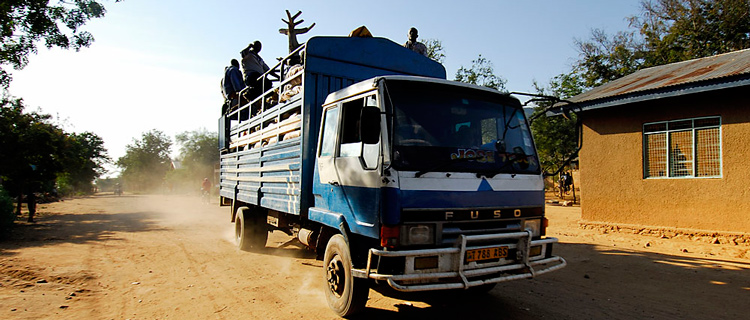
Small-scale water management
Making it in Makanya
Holistic approaches to sub-Saharan farming can unlock poverty traps
Although the reasons for persistently low yields experienced among smallholder farmers in Tanzania are many, one fundamental reason is the frequent lack of water. Efforts to deal with the water scarcity include small-scale solutions such as in situ soil and water conservation, run-off water harvesting and smaller irrigation systems.
In a recently published article in Global Environmental Change, centre researcher Elin Enfors has looked at how these 'small-scale water system innovations' (SWSIs) can improve agricultural productivity and lift farmers out of what has turned out to be a resilient poverty trap. Her conclusion is that they can, but not without conditions.
Request article
"Overall the analysis shows that SWSIs can help transform these systems and improve the conditions for the farmers, but there are certain requirements that need to be fulfilled to realize this potential," Enfors says.
Method
Along with data from several studies between 2004 and 2008, Enfors tested a range of SWSIs at different sites in Makanya, a catchment populating some 40,000 people in North-Eastern Tanzania. Similar to other rural areas in dryland sub-Saharan Africa, Makanya has been hit by drought over the past decades.
Through interviews and field research, Enfors studied the various strategies the Makanyan farmers employed to cope with drought. She also used participatory scenario planning to identify opportunities and threats in using new SWSIs.
Her analysis shows that the Makanya catchment is trapped in a situation where yields frequently fail and other ecosystem services are being degraded, while people still remain poor. SWSIs can help unlock this trap and support more productive development trajectories. However, they operate on a thin line between failure and success.
"Designing an efficient water system innovation often requires professional water engineering knowledge. As rural smallholders rarely have access to that, implemented systems often do not yield the expected benefits," Enfors says, listing several other requirements for the systems to be successful.
Roadworks ahead
One is that farmers have great difficulties investing in these new practices unless they receive micro credit financing, crop insurance schemes and other kinds of support. Often there is a time lag before the investment yields a return, leaving the farmers temporarily vulnerable.
Another requirement is that infrastructure, market access and storage technology must be improved. In Makanya, infrastructure is basic and the farmers lack easy access to external markets. Instead of selling their surplus, the farmers store it for later consumption, but storage pests are destroying most of the surplus even before the next harvest.
No donkey work
And then there is the social and cultural context. In Makanya, many villagers found it unacceptable to use oxen for traction during land preparation because the animals were considered to be too valuable. Instead they used donkeys, despite the fact that the equipment was designed for oxen traction.
All in all, says Enfors, prerequisites for successful investments in small-scale water system innovations are solutions that integrate water management with approaches to tackle other farmer level constrains, such as nutrient and pest management, but also with interventions that address surrounding socio-economic constrains.
"SWSIs have great potential for levering transformative change in SSA, but the potential will not be realized until investments in these technologies are broad-based enough to also deal with other constraints," she concludes.
See whiteboard seminar with centre researcher Elin Enfors, explaining the concepts of poverty traps and transforming livelihoods into more sustainable pathways:
References
Enfors, E., Social—ecological traps and transformations in dryland agro-ecosystems: Using water system innovations to change the trajectory of development. Global Environ. Change (2012), http://dx.doi.org/10.1016/ j.gloenvcha.2012.10.007
Elin Enfors is a CIRAD postdoc, coordinating the centre project "Human dimensions behind the re-greening in Sahel". Her main research interest concerns the dynamics of freshwater and agro-ecosystem services, and how this links to poverty alleviation, in the drylands of sub-Saharan Africa.






